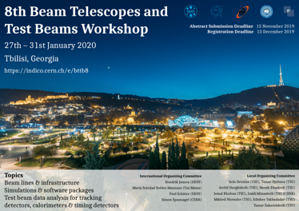Speaker
Mateusz Dyndal
(CERN)
Description
MALTA is a novel monolithic active pixel CMOS sensor chip designed in TowerJazz 180nm technology. The chip contains 512x512 square pixels with a pitch size of 36.4 μm, and has a thickness down to 100 μm. A MALTA telescope has been developed that contains 3-6 planes. In this contribution we will review the performance of the telescope evaluated during recent testbeam campaigns at DESY and ELSA. The results show that the MALTA-based telescope is capable to characterise new devices with good spatial resolution at high event rates. The measurements of new sensor types with improved radiation-hardness will be also outlined.
Primary authors
Mateusz Dyndal
(CERN)
Carlos Solans Sanchez
(CERN)
Valerio Dao
(CERN)
Heinz Pernegger
(CERN)
Abhishek Sharma
(University of Oxford (GB))
Ignacio Asensi Tortajada
(Univ. of Valencia and CSIC (ES))
Patrick Moriishi Freeman
(University of Birmingham (GB))
Leyre Flores Sanz De Acedo
(University of Glasgow (GB))
Roberto Cardella
(University of Oslo (NO))




